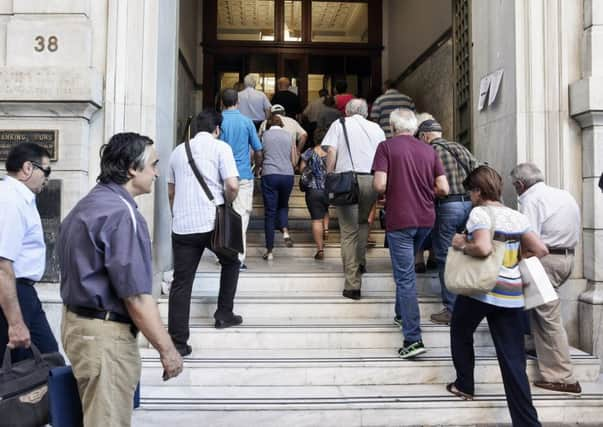Greek banks re-open as tax rises start to bite


However, strict controls on the amounts individuals can withdraw remain and new austerity taxes demanded by Greece’s European creditors mean that most everyday items are more expensive, from coffee to taxis to cooking oil.
In downtown Athens, people queued up in an orderly fashion yesterday as the banks unlocked their doors at 8am, but restrictions on most transactions remained.
Advertisement
Hide AdAdvertisement
Hide AdThough the daily cash withdrawal limit stayed at €60 (£42), the government has given individuals a new weekly limit of €420 (£293) from this coming Sunday so they don’t need to trudge to the ATM every day.
Ready cash is something Greeks will need as new taxes also came into effect on a wide array of goods and services on Monday.
Sales taxes have risen from 13 per cent to 23 per cent on many basic goods – including some meats, cooking oils, coffee, tea, cocoa, vinegar, salt, flowers, firewood, fertiliser, insecticides, sanitary towels and condoms.
Popular services were also hit by the new taxes: restaurants and cafes, funeral homes, taxis, ferries, exam-cramming schools and language schools.
The new taxes are part of a package of confidence-building measures that the Greek government had to introduce in order for negotiations on a third bailout to begin.
Since the Greek parliament passed the measures, creditors have sought to relieve the pressure on Greece. The European Central Bank has raised the amount of liquidity assistance on offer to Greek banks while Greece’s partners in the 19-country eurozone agreed to give Athens a short-term loan so it wouldn’t default on a €4.2 billion debt due to the ECB on Monday.
Mina Andreeva, a spokeswoman at the European Commission, confirmed yesterday that the €7.16bn three-month loan has been sent to Athens so it can repay the ECB and also to clear arrears with the International Monetary Fund.
Meanwhile, a group of French tourists sparked anger in Greece by refusing to pay to enter an archaeological site – because France is already bailing out their bankrupt economy.
Advertisement
Hide AdAdvertisement
Hide AdThe argument erupted on the island of Rhodes when the group said they objected to “paying Greece twice” to visit the ancient ruins of Lindos.
The tourists insisted that because France is among Greece’s major European creditors, they had already done enough to boost the beleaguered nation’s finances. But security guards refused to let them enter and tour party left without gaining access to the site. An official in Lindos said: “We are frankly quite offended at their refusal to pay.
“They said they had already paid our country once, so had a right to enter where they liked.”